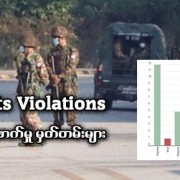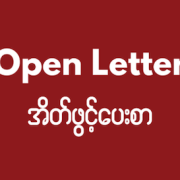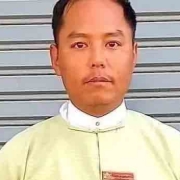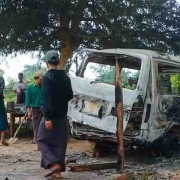Imprisoned labour organisers released after signing junta pledge
A group of workers and their supporters, who were arrested after demanding higher wages in the garment industry earlier this year, were freed this week after pledging not to participate in unlawful associations.
The 12 workers’ rights advocates included employees of the Hosheng Myanmar Garment Factory, employees of the Sun Apparel Myanmar factory, activists affiliated with the Action Labor Rights organisation, and the owner of a tea shop where they regularly met.
On June 14, several of the activists went to the general administration office in Shwepyithar Township, Yangon, to register a complaint about the dismissal of seven Hosheng Myanmar employees who had asked for a raise.
Junta authorities arrested the labor activists and their associates over the next several days, holding two at the Shwepyithar police station and transferring the remaining ten to Insein Prison.
Authorities initially brought charges against the detainees under Section 505(a) of the Myanmar Penal Code on incitement, under Section 17(1) of the Unlawful Associations Act, and under Section 40 of Registration of Associations Act.
However, the junta released the detainees on Monday after giving them a document to sign, according to Thurein Aung, a spokesperson for Action Labor Rights.
“According to the letter, if they engage in unlawful associations, they are subject to having their penalties doubled,” he said, referring to the document signed by the detainees.
“They had to sign it with their fingerprints,” he added.
Shortly after the labour activists’ arrest in June, a regime-controlled newspaper reporting the incident accused Thurein Aung and another associate of the Action Labor Rights organisation, Thuza, of incitement. Both have had to take precautions to avoid arrest in the intervening months.
It is uncertain whether the garment factory workers will return to their jobs at Hosheng Myanmar and Sun Apparel following their release.
“A complaint has been filed with the labour office regarding their dismissals and the case has been accepted. But investigations on the case haven’t started. I don’t know whether the factories will rehire them,” Thurein Aung said.
“We have appealed to Zara about re-employing them,” Thurein Aung said, referring to the flagship retail brand of the clothing company that sources clothes from the Hosheng factory.
Inditex, the parent company for several globally recognised clothing retailers including Zara, announced plans in June to make a “gradual” exit from Myanmar following international condemnation of the junta’s treatment of garment industry workers.
This year, after living through more than two years of inflation since the military coup, more workers began to demand an increase in the minimum daily wage from 4,800 to 5,600 kyat.
Authorities are required by law to readjust the minimum wage in Myanmar every two years, but the last adjustment occurred in 2018 during the administration of the National League for Democracy, when it increased from 3,600 to 4,800 kyat for an eight-hour workday.
The wage has remained the same under the military regime, as authorities have ignored the requirement to adjust the wage and suppressed protests organised in support of workers’ rights.








